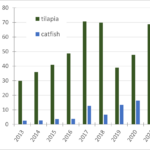To support the ongoing collaboration between IFPRI and the Department of Agriculture and Livestock (DAL), PNG, in revising the National Food Security Policy (NFSP) 2017-2027, a two-week data analysis training program was organized for DAL analysts in Aug-Sept 2024. The hands-on training sessions organized by Emily Schmidt, Rishabh Mukerjee, Helmtrude Sikas Iha, and Harry Gimiseve […] Source: IFPRI Capacity Strengthening
Capacity Strengthening Workshop on Agri-food Trade Policy Analysis in Bangladesh
The Policy Research Institute (PRI) of Bangladesh in partnership with Devesh Roy, Mamata Pradhan, Sunil Saroj, and Abul Kamar from IFPRI-South Asia, conducted a two-day capacity strengthening program on agri-food trade policy analysis in Dhaka. The program brought together participants, experts, and stakeholders from leading institutions in India and Bangladesh from the agri-food trade sector. […] Source: IFPRI Capacity Strengthening
Training on Applying the Women’s Empowerment in Agrifood Governance (WEAGov) tool
Jordan Kyle and Catherine Ragasa conducted a training for African Women in Agricultural Research and Development (AWARD) fellows and their mentors from 12 African countries on how to use the Women’s Empowerment in Agrifood Governance (WEAGov) framework and tools to support their policy innovation projects. The WEAGov assessment tool measures women’s voice and agency in […] Source: IFPRI Capacity Strengthening
Enumerators and Supervisors Training: Baseline Survey on ‘Solar Dryer Intervention for Post-harvest Management’ RCT study
Bedru Balana and Olufemi Popoola co-organized an enumerator training for the baseline survey on 'Solar Dryer Intervention for Post-harvest Management' randomized control trial (RCT) study in Kano State, Nigeria. The four-day training of enumerators, field supervisors, and local project partner organization focused on the basics of RCT survey design, research ethics on human-subjects, consent form, […] Source: IFPRI Capacity Strengthening
Validation workshop: Developing guidelines for introduction and management of exotic fish species and strains, and code of practice for aquaculture establishments in Ghana
Aquaculture is major source of livelihood and employment for many Ghanaian households (Ragasa et al., 2022). Fig 1 below indicates that Ghana has experienced significant growth in aquaculture production over the last decade. Main factors accounting for this growth include introduction of improved ‘Akosombo strain’ of Nile tilapia, government interventions within the sector such as, […] Source: IFPRI Ghana
- « Previous Page
- 1
- 2
- 3
- 4
- …
- 22
- Next Page »

